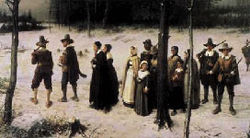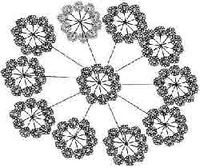Intentional community: Difference between revisions
No edit summary |
No edit summary |
||
| Line 1: | Line 1: | ||
[[Image:pilgrims.jpg|250px|right|thumb|The intent of individuals collectively determine the nature of the an [[Intentional Community]].]] | [[Image:pilgrims.jpg|250px|right|thumb|The spiritual intent of individuals collectively determine the [[Community Ethics]] and [[Community Law]] the nature of the an [[Intentional Community]] because the [[Sense of Community|sense of the community]] and their [[Community Types|types]].]] | ||
== Defined communities == | == Defined communities == | ||
Revision as of 12:22, 29 June 2016

Defined communities
- An intentional community is a planned community which is often residentially designed from the beginning to have a high degree of social cohesion through a common interaction.
The members of an intentional community often hold common values which involve a social, political, religious, or spiritual vision. They will often follow lifestyle with particular goals or purposes in mind. They typically share some responsibilities and resources.
Intentional communities include collective households, cohousing communities, ecovillages, communes, survivalist retreats, religious orders, kibbutzim, ashrams, and housing cooperatives.
Audio files
Ancient communities

Most ancient civilizations evolved from intentional communities. The foundational values that are held by a community will dictate the growth or decay of a society.
The Greek city states evolved a number of different societies and as they shifted values they also shifted the nature of their society. The shift created new problems or dynamics which cause values to shift again. Societies may change over time from generation to generation until the society fails.
What are the essential parameters of a free and prosperous society?
Rome, the Teutons and ancient Israel all began with specific sets of values or Social Virtues all shifted those values based properties of their community which changed society and then changed the moral character of the people within society and then another shift in values occurred producing new changes.
Each of these societies created foundational structures which set the moral character of society. From the 12 Tablets of Rome to the Ten Commandments of Israel those basic outlines of acceptable elements of society set the boundaries of those free societies. While the desire for personal liberty is important, whether escaping from the tyranny of Tarquinian kings or Corvee despotism of the Pharaohs of Egypt, far more important is the pervasive and cultivated desire to sustain the freedom and rights of your neighbor.
In other words the golden rule of caring about your neighbor as much as yourself is an essential element of a free society. What rituals and ceremonies with in society might foster and enhance that element within the hearts of the people?
Understanding these foundational values, guidelines and limits in their many forms and comprehending where straying from them brings social change and even degeneration is not only important but essential in a sustainable community that wishes to be free.

It is inherent in the nature of man to desire relationships within society that promotes a “Sense of Community” of belonging, a feeling that you matter to others within your group or tribe. This Sense of Community comes from practices that confirm a mutual commitment which encourages respect, honor and compassion.
The rituals or practices and ceremonies of an intentional community should establish, nurture and affirm that sense of community from generation to generation. That sense of community must run deep within the heart and mind of individuals to sustain loyalty during the extremes of societal hardships.
James Scott has looked at such remote societies that chose to be free rather than being comfortable or pursuing the promised comfort of an organized state. Abraham departed the city State of Ur to form an Intentional Community and did so with his Altars of Living stones. Moses left the state of Egypt to form a free state with no exercising authority from the top down where every-man was king in his own home. Christ started an Intentional Community when he appointed a kingdom to His Apostles where there were no Benefactors who could exercise authority since the people lived by faith, hope and charity and the perfect law of liberty with Lively Stones forming living Altars of social welfare.
The Christian conflict was also mostly about not participating in the state religion which consisted of the covetous practice of state sponsored Corban which is so popular with Modern Christians.
One of the natural governing agents of society is the purpose for gathering to support the well being of the people using the Charitable Practices of a voluntary system of Daily ministration.
The purposes of intentional communities vary. They may include sharing limited resources, creating physical or financial safety and a more spiritual and emotional commonality.
The way in which you do this and the bands that society depends upon to hold it together will determine the nature of society and the people within it.
Approaches
Over the history of mankind intentional communities have followed numerous criteria in the acceptance of new members. There were often certain qualifications or trials to face. Certain patterns of behavior were either required or members could be shunned or cast out of the community. Participation in certain activities were often required.
New members of an intentional community today are often selected by the community's existing membership, the leaders or a board rather than by real-estate agents or land owners especially if the land is owned collectively by the community. If we look at intentional communities of the past we can learn from their successes and failures about the best methods for keeping these communities viable and healthy?
This idea of intentional communities is a major topic of the Network.
In the formation of a community, a great deal of consideration should be given to Community Ethics and Community Law, as well as the distinctions between Society and community.
In its widest sense society is "the people in general..." [1] but community is the result of communion of the people as a unction within society.
Community |
Intentional Community |
Sense of Community |
Community Types |
Community Ethics |
Community Law |
Voluntary society |
Voluntaryist Constitution |
Volunteer |
Society |
Individualism |
Liberalism |
Classical liberalism |
Transcendentalist |
Communities Ancient |
Communitarian |
Collectivism |
Identity politics |
Socialism |
Communism |
Primitive Communism |
Communion |
Eucharist |
Social Virtues |
Daily ministration |
Tens |
FEMA |
Burning Bush Festival |
Burning Bush Festival |
Feasts |
Feasts and festivals |
Pentecost |
Celebrate |
Law |
Rights |
Economy |
Education |
Welfare types |
Stimulus |
Building back |
The Greatest Reset |
Agorism |
Permaculture |
Guru theories |
Perfect law of liberty |
Benefactors |
Covetous practices |
Christian conflict |
Pure Religion |
Public religion |
Imperial Cult of Rome |
gods |
Covet |
First to do List |
Fundamental orders |
Network |
Law
Law |
Natural Law |
Legal title |
Common Law |
Fiction of law |
Stare decisis |
Jury |
Voir dire |
Consent |
Contract |
Parental contract |
Government |
Civil law |
Civil Rights |
Civil Government |
Governments |
No Kings |
Canon law |
Cities of refuge |
Levites |
Citizen |
Equity |
The Ten Laws |
Law of the Maat |
Bastiat's The Law and Two Trees |
Trees |
The Occupy Refuge Movement |
Clive Bundy |
Hammond |
Barcroft |
Benefactors |
Gods |
Jury |
Sanhedrin |
Protection |
Weightier matters |
Social contract |
Community Law |
Perfect law of liberty |
Power to change |
Covet |
Rights |
Anarchist |
Agorism |
Live as if the state does not exist |
Rights |
Property rights |
Human Rights |
Human Events |
Law |
Natural Law |
Civil law |
Legal |
Common Law |
Fiction of law |
UNIVERSAL DECLARATION OF HUMAN RIGHTS |
Parents have a prior right |
Universal Declaration on Bioethics and Human Rights |
Human resources |
Merchandise |
Employ |
Universal Service |
Tribute |
Corvee |
The Way |
Foolishly |
Foolish virgins |
The Right of Self-determination |
Fraud |
Free Assemblies |
CORE |
Righteousness |
Workers of Iniquity |
Doers of the Word |
Fruit |
Newsletter |
Dear Network |
Network Notes |
The Kingdom Newsletter |
Thought for the day |
Events List |
Free speech |
Conversation
==Footnotes==
- ↑ "Society. An association or company of persons (generally unincorporated) united together by mutual consent, in order to deliberate, determine, and act jointly for some common purpose." "In a wider sense, the community or public; the people in general..." Black's Law dictionary 5th Edition